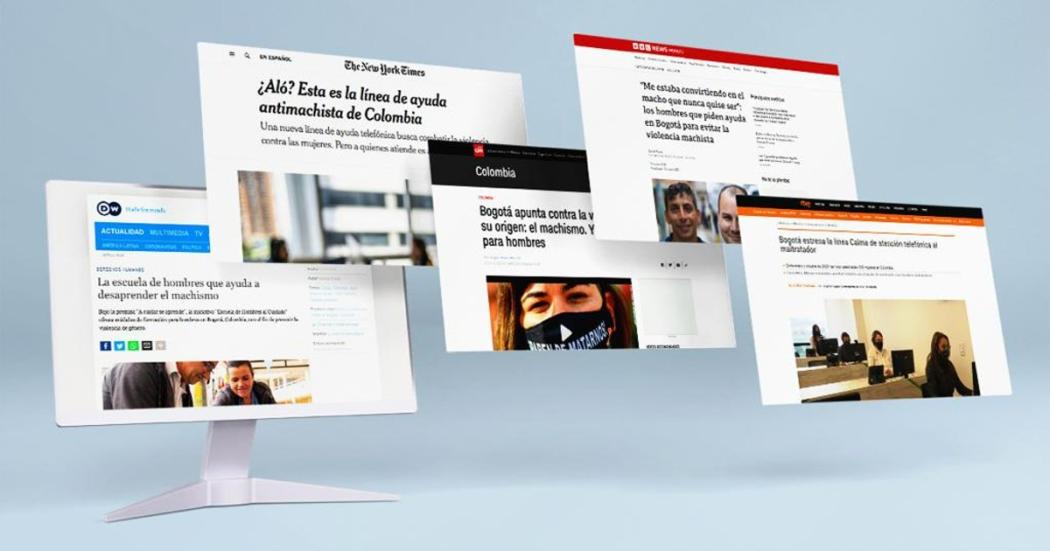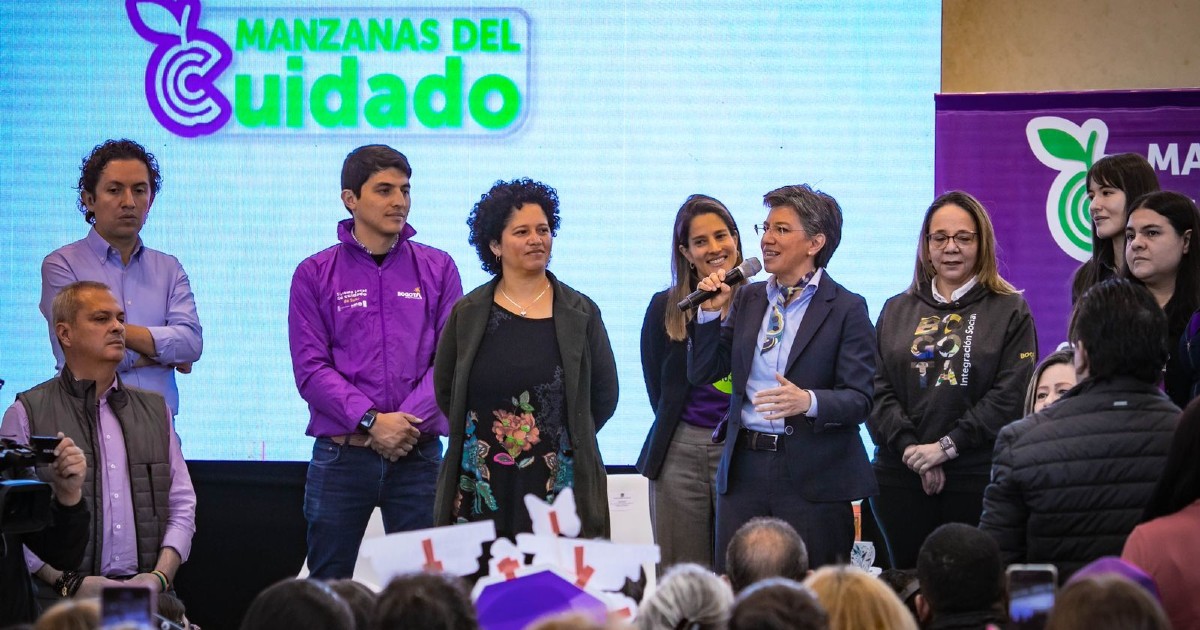In recent months, international media have highlighted the work of the administration of Mayor Claudia López, with the implementation of the Calm Line (Línea Calma) and the Men in Care (Hombres al Cuidado) school, which aim to accompany and provide men with alternatives to help them assertively resolve situations of emotional conflict with partners, family, or friends, and also learn household skills.
The Deputy Secretary of Citizen Culture of the Secretary of Culture, Recreation and Sports of Bogotá, Henry Murraín emphasized that "it is important to reflect on how love is expressed within a macho society. Generally, beliefs and stereotypes such as 'jealousy shows love', ''if he controls me it is because he cares about me'' are established. These actions generate justifications for such violence. We need to change the perception of what it means to be a man: they can be emotional, caring, loving, resolve conflicts peacefully, and understand that this idea of masculinity is a straitjacket that causes harm to themselves and the rest of society."
The Calm Line aims for the cultural and behavioral transformation of masculinities, operates for free, and is attended by a group of psychology professionals from Monday to Saturday between 8:00 a.m. and 10:30 p.m., and on Sundays between 2:00 and 10:30 p.m.
In December 2020, the Spanish media RTVE highlighted the launch of the Calm Line in their article ‘Bogotá launches the Calm Line telephone support for abusers,’ and the work of one of the psychologists who answers the calls. The psychologist explained the support provided to men who contact the line: "We try to calm the person down by asking them to please sit down, listen, and if they're with someone else, to step away and focus solely on my voice. These are guidelines we use first to deactivate the violence and from there, for him to start talking and expressing what is happening. This also allows us to gain time while we call the police and other emergency services to intervene," Diana told RTVE.
"In the man who can do everything, who controls everything, there is a deeply insecure and tormented man (...) We seek to prevent macho violence through an understanding and attention to its emotional causes," Murraín told BBC Mundo in October 2021, when the media outlet also highlighted the case of Alex Rodriguez, a 31-year-old baker and artist from Bogotá who called the line because, ‘I was becoming the macho I never wanted to be,’ he told BBC Mundo, and whose quote was the headline of the publication.
Radio Ambulante produced a podcast describing the process of a man seeking help after a jealous attack on his partner in a public place.
‘Bogotá targets gender violence at its source: machismo. And it does so with a line for men’ is a publication of CNN Latin America, in October 2021, in which it ensures that beyond violence also accompanies the processes of 'heartbreak'.
"Breaking with a deeply rooted idea: that the only valid emotion for men is anger", assured the man to this media who knew first-hand experiences of psychologists who attend the line and men who call for help.
The New York Times highlighted in October 2021, in the article ‘Hello? This is Colombia's anti-machismo helpline,’ the work of the Mayor of Bogotá, Claudia López, who "has made the fight against machismo part of her government plan." Additionally, it mentions the Men in Care school, designed for men to learn household chores.
DW (Deutsche Welle), a German media outlet, also does this in its publication ‘School for Men Helps to Unlearn Machismo,’ featuring the testimony of Holman Rivas, a young man who was part of the Men in Care school and says, "There are things that I now see differently. I now value the time that a mother or wife spends preparing food, washing dishes, or doing laundry. The School helps to understand that not only women have to do household chores; many men live old-fashioned and it's not a fact," Rivas told DW.
The Spiegel Online German-language news website in its publication "One Man's Crusade Against Machismo in Latin America" states that "Machismo is widespread in Latin America. The Undersecretary of Culture of Bogotá would like to change that and redefine what it means to be a man. She has developed a program to teach men how to cook, change diapers, and talk about their feelings."
Infobae also reports on this issue, highlighting the recent celebration of International Men's Day as an "opportunity to learn and get involved in caregiving tasks." The article explains that the 'A cuidar se aprende' (care can be learned) strategy "aims to redistribute care equitably, providing better opportunities for caregivers. It was launched in 2021 and is aimed at men over 18 years old."
But what is the school that helps men unlearn machismo, and how does it work? Biobío Chile explained this on March 19th, stating that "Under the premise of learning to care, the school teaches much more than just changing diapers and cooking. The care of the home, the care of others, emotional care (with special emphasis on non-violent conflict management), and caring for the environment are all part of the initiative's content. It operates both as an itinerant bus that travels around Bogotá and as a physical location in the Care Blocks.
On March 22nd, Núcleo Noticias (Venezuela), TN8 (Nicaragua), El Imparcial (Mexico), Milenio (Mexico), Upsocl (Latam), and Cooperativa (Chile) all highlighted the YouTube channel created to provide content for men to learn various domestic tasks, including aspects such as child-rearing and healthy emotional management. "The initiative aims to gradually eliminate macho behaviors," Cooperativa stated.
Univisión also mentioned that in the videos uploaded to YouTube, "The hosts start from scratch, explaining in simple language what products can be used to do the housework, the utensils needed and how to plan their schedules to make time for these activities on a weekly basis. In less than 5 minutes men can learn the basics for the various tasks by giving examples and in some of their tutorials, they highlight why it is important for them to participate in household chores".
La Silla Rota stated that "The creation of multimedia content to bring citizens closer to household work is an action that places under the lens the disparities faced by women who dedicate up to 30 hours per week to these tasks."
The Italian news outlet La 27ora highlighted the pedagogues of the Men in Care (Escuela Hombres al Cuidado), which teach men to recognize their emotions and understand when to ask for help, in their article "Colombia: the School that teaches men not to be 'macho'."
These programs have also been highlighted in the national media
The radio station of Francisco José de Caldas University (LAUD) interviewed Henry Murraín, who stated about the Men in Care School that "The objective is for us to assume the role...to promote the elimination of machismo in Bogotá through the promotion of new masculinities and the redistribution of care work."
Transforming the macho culture: "A Cuidar se Aprende" and "Hombres al Cuidado", is a Caracol Radio publication that mentions that this initiative also encourages the active participation of men in the upbringing and care of children and household chores. The strategy has several fronts, such as the Mobile School, the Territorial School, and the Virtual School".
RTVC Noticias states that with the aim of achieving true gender equity, 'A Cuidar se Aprende' and 'Hombres al Cuidado' were launched and emphasizes that the work is to change the "general belief that women have by nature more skills and patience to perform care work than men."
El Espectador lists in the article 'Virtual school open to teaching men about household chores' the 4 types of care in which men can be trained:
- home care: focusing on the physical spaces that are inhabited.
- Caring for others: aimed at caring for people such as children and the elderly, as well as self-care practices in physical and mental health.
- Care of emotions: identification of tools for the processing and management of emotions.
- Environmental care: waste separation and reflection on the participation of men in environmental care in the private and community sphere.
TeleMedellín and Noticias Súper highlighted that currently, the Aprender a Cuidar School is located in 17 'Care Blocks' that men in Bogotá can visit to learn about care at different times.







